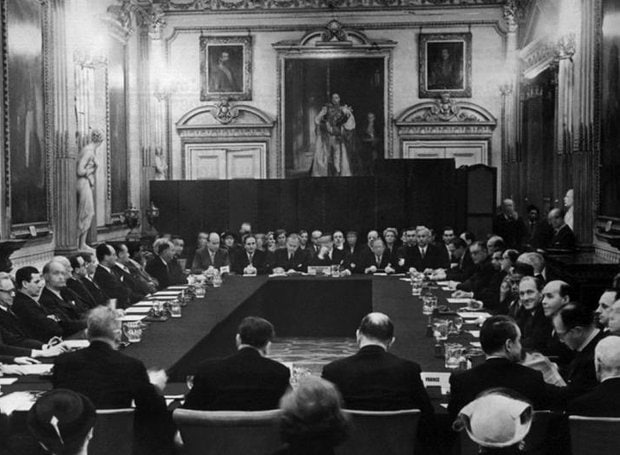On February 27, 1953, German-led creditors of the United States gathered in London to settle Germany's debt, in particular West Germany's debt. German debt (pre-war and post-war) amounted to DM 32 billion, not counting war reparations and allowances. Creditors included countries such as the United States, Canada, France, Great Britain, Iran, Italy, Spain, Switzerland, Yugoslavia, South Africa and Greece. Russia and the countries of Eastern Europe did not participate in the negotiations.
The negotiations lasted for about six months and on August 8, 1953 the London Agreement on German External Debts was signed (London Debt Accord) , which provided for a 60% haircut and repayment of 30 years. An important condition of the agreement was that repayment would be made if West Germany had a trade surplus and debt service would not exceed 3% of its export trade income. From the Greek point of view, the agreement was signed by our ambassador to London, Leon V. Melas, and ratified by Parliament with Law 3480/56
What is the London Debt Accord?
February 27th 1953 is the day on which the ‘London Debt Accord’ was signed, an extraordinary agreement that cancelled much of Germany’s pre and post war debts. The exceptional character of this agreement is its comprehensive nature – it cancelled a huge portion of Germany’s debts, and it was signed by countries that had been at war only a few years previously, including the highly indebted new German Federal Republic (the successor to Hitler’s Germany), and Germany’s creditors, the western Allies, led by England, France and the USA, but also including countries such as Greece which had recently experienced German military occupation.
2. How much of Germany’s debt was cancelled?
Germany had been destroyed by war, and was incapable of paying its external public debts in the post-war years. Despite some agreed reduction in its post-war debt, its pre-war debts remained enormous and unsustainable. The Accord cancelled about 50% of Germany’s debt – roughly equivalent to the value of 75% of Germany’s exports in 1950. Of Germany’s remaining debt stock, further relief was granted through a reduction in interest payments due on its various component parts.
The London Conference agreed a comprehensive solution on how to deal with Germany’s outstanding debts relating to two constituent parts:
- Loans that Germany had taken out during the time of the Weimar Republic to meet the reparation arrangements of the 1919 Treaty of Versailles, which had twice been rescheduled and later partially cancelled. In addition, there were the debts of other public institutions and German private debtors to the tune of 5.8 billion DM (or nominally €2.9 bn), so that all pre-war debts of 13.5 billion DM (or nominally € 6.7 bn) were on the table and discussed.
- Loans that the federal government had received from the western powers, in particular the USA, after the Second World War to finance reconstruction.
3. Who was involved?
Twenty two representatives from creditor countries took part, as well as the Bank for International Settlements (BIS) and representatives of private lenders, with the driving force behind the negotiations being the US government. During the negotiations German private and public debt owed to public and private entities from the following countries was dealt with, and all were signatories to the Accord: Belgium, Ceylon (today Sri Lanka), Denmark, France, Greece, Iran, Ireland, Italy, Yugoslavia, Canada, Liechtenstein, Luxemburg, Norway, Pakistan, Sweden, Switzerland, Spain, South Africa, Britain and the USA. In 1963 the following states and territories acceded to the accord: Aden, Egypt, Argentina, Australia, Belgian Congo (today DRC), British Channel Islands, Chile, Finland, Falkland Islands, Gibraltar, Israel, Cambodia, Cameroon, Malta, Morocco, New Guinea and Nauru, New Zealand, Netherlands, North Rhodesia and Njassaland, Austria, Peru, Syria and Thailand.
In March 2015 Greece's prime minister Alexis Tsipras unsuccessfully demanded Germany pay back more than €160bn (£112bn) in Second World War reparations as his country squeezed by creditors to overhaul its economy in return for vital bail-out funds.


